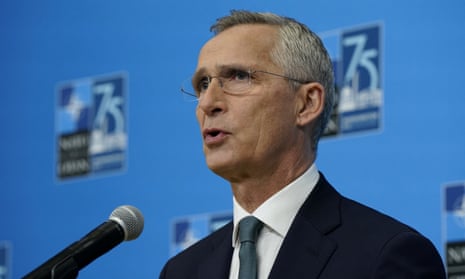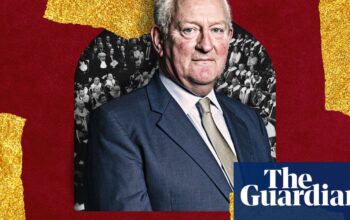This will be a historic summit, he said, adding that the alliance will do more than celebrate its 75th anniversary, but “make important decisions” for the future.
“On Ukraine, I expect allies to agree a substantial package,” he said.
This will include five parts, according to Stoltenberg:
-
Nato command to provide security assistance and training
-
A long-term pledge to continue sustaining support
-
New announcements of immediate support, including air defence
-
New bilateral security agreements
-
Stepping up work on interoperability
“All together, these five elements constitute a strong bridge for Ukraine to membership of the alliance, and I’m confident that allies will then reiterate the commitment to that Ukraine will become a member of Nato,” he added.

Nato, bigger now than it’s ever been, more united than it’s ever been and absolutely clear eyed about the threat of Russian aggression,” he added.
Dick Schoof, the new Dutch prime minister, said he “assured” Ukraine’s president “once again of the Netherlands’ continued support for Ukraine: whatever is needed, for as long as it’s needed.”
“For instance, the Netherlands is working with the US, Germany, Italy and Romania to strengthen Ukraine’s air defence, and the Ministry of Defence has just announced that in the coming years more funds will be set aside for F-16 ammunition,” he added.
“Today we reaffirm our ironclad commitment to a strong EU-NATO partnership anchored in our shared values,” said the outgoing European Council president, Charles Michel.
The first F-16 fighter jets are on their way to Ukraine and will be flying sorties this summer, according to a statement from the Dutch and Danish governments that was released by the White House at the Nato summit.
Dick Schoof, the prime minister of the Netherlands, and Mette Frederiksen, his counterpart from Denmark, said the “transfer process” of F-16s to Kyiv was under way after months of pilot training and political negotiations.
The two leaders said that “Ukraine will be flying operational F-16s this summer” – the first of about 85 of the combat aircraft that have been committed to Kyiv to turn around its fortunes on the battlefield.
An announcement on F-16s had been expected at the same time as the summit, and the hope is that the fighters will be able to stifle Russian glide bomb attacks launched from warplanes operating up to 43 miles (70km) away that have been devastating frontline positions.
Read the story here.
Speaking at the Nato public forum, the alliance’s secretary-general Jens Stoltenberg spoke of past delays to support for Ukraine but that “now we are providing more support and I’m confident that allies will now actually deliver.”
The purpose of a stronger Nato role in providing training and security assistance, he added, is “to minimise the risks for future delays and gaps.”
But, he said, “you don’t have guarantees, because at the end of the day it has to be support in all the individual allied capitals and parliaments.”
The purpose of creating a stronger Nato framework, he said, is making support more robust and predictable.
Stoltenberg also pushed back against the perception that the US is nearly alone in its support for Kyiv, emphasing the role of Europe and Canada.
Keir Starmer comes under pressure to say when Britain’s defence spending will hit 2.5% of GDP.
Luke Pollard said on Wednesday the government wanted to hit the target promised by the former prime minister Rishi Sunak, but would not be able to do so without economic growth.
His comments come as the prime minister begins a two-day visit to Washington DC for the 75th-anniversary Nato summit, at which he will urge other member countries to increase their defence spending.
Pollard told BBC Radio 4’s Today programme: “The way we deliver increased public spending on defence, on schools, hospitals or prisons, is by growing our economy. If we don’t grow our economy, there won’t be the money to support those public services and the ambitions that we have – and that includes defence.”
Read the full story here.
Lloyd Austin, the US defence secretary, is now speaking at the Nato public forum.
The alliance will continue implementing its new plans, which will improve its ability to deter and defend against any new threat, he said.
Austin also noted that the alliance will work to endorse a pledge to expand industrial capacity, which would help scale up military production and send a long-term signal to industry.
He also said the alliance will deepen cooperation to support Ukraine’s self-defence.
“Today, president Biden alongside the Dutch and Danish prime ministers is proud to announce the transfer of F-16s is officially underway, and Ukraine will be flying F-16s this summer,” he said.
Volodymyr Zelenskiy, the Ukrainian president, said he is grateful to countries taking steps to help Ukraine’s air force get F-16s.
“I am grateful to the United States, Denmark, and the Netherlands for taking practical steps to achieve the goal of all Ukrainians: to strengthen the Ukrainian air force with F-16s,” he said.
He added:
I anticipate that our air force capability coalition will be strengthened even further through the joining of new participants. F-16s bring just and lasting peace closer, demonstrating that terror must fail everywhere and at any time.
Our team continues to work in Washington to reach agreements that are strengthening Ukraine’s defense capabilities.
Pedro Sánchez, Spain’s prime minister, stressed a message of solidarity to Ukraine when arriving for the summit. Ukraine is not only defending itself, he said, it is defending the rules-based international order, international law and democratic values, the Spanish leader said.
He also spoke of security of the alliance’s southern flank.
The Spanish leader also mentioned Spain’s win against France.
Norway’s prime minister, Jonas Gahr Støre, told reporters when arriving for the talks that “we are 32 democracies and there are always elections in democracies some year, and making strong unity among democracies is seldom straightforward – but when you make it, it is extremely strong. And I think it is strong now.”
The German chancellor, Olaf Scholz, has underlined the importance of Nato support for Ukraine, Reuters reported.
“Germany is the largest country in Europe within the Nato alliance. This gives us a very special responsibility and I can say very clearly here we will, I will, fulfil this responsibility,” Scholz said.
Antony Blinken, the US secretary of state, is now speaking at the Nato public forum.
Watch here:
Rustem Umerov, the Ukrainian defence minister, has thanked partners who have made decisions on donating air defence systems.
“New announcements are coming soon! Air Defence is our priority,” he wrote.
Norway will donate six F-16 fighter jets to Ukraine this year, the Norwegian prime minister’s office announced.
Here are some images from Washington today.
“Friends. Partners. Allies.”
Source: theguardian.com


